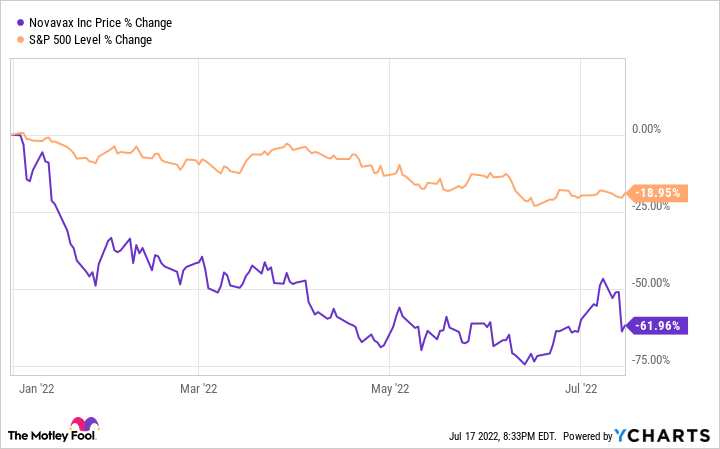Could Novavax (NVAX -2.51%) climb back into positive territory in the stock market this year? On the one hand, some investors are skeptical regarding the future of the COVID-19 vaccine market, and many biotechs specializing in this niche have taken it on the chin.
On the other hand, Novavax finally cleared one of its most important (and long overdue) regulatory milestones. What's next for the vaccine maker? Let's discuss Novavax's recent regulatory win and what it means for the company's future.
It's been a long road
On July 13, the U.S. Food and Drug Administration (FDA) granted emergency use authorization (EUA) to Novavax's coronavirus vaccine, Nuvaxovid. The nod came nearly six months after the biotech formally announced that it had completed its submission to the FDA. It took the agency much less time to grant EUA to other vaccines, including Pfizer's and Moderna's.
While it is true that these candidates earned the nod when we were still near the pandemic's peak, Novavax's comparatively long road to authorization was a worry for some investors. Further, Novavax had delayed submitting its application to the FDA multiple times as it battled manufacturing issues.
The combination of these factors partly explains why Novavax has lagged the market recently, but now that its candidate has been granted EUA, can the company turn things around?
Nuvaxovid's potential in the U.S.
Novavax's vaccine proved about 90% overall effective against COVID-19 in a phase 3 clinical trial, and its efficacy against moderate and severe cases of the disease came in at 100%. Those results are more or less on par with some of the top coronavirus vaccines on the market, but Nuvaxovid differs from some of the current market leaders in the U.S. in important ways.
First, it is a protein-based vaccine; it fits the mold of the traditional methods of developing vaccines. That's in stark contrast to Pfizer and Moderna, whose vaccines are mRNA-based, a relatively new method. Some patients have expressed skepticism toward mRNA-based products. A poll commissioned by biotech company Ocugen found that 73% of Americans would like more vaccine options developed using traditional methods.
Second, Nuvaxovid comes with storage requirements that are a bit less stringent. As Chief Commercial Officer John Trizzino said last year, "Storage at standard refrigeration temperatures allows our vaccine to use the existing vaccine supply chain and will increase access to hard-to-reach areas to improve vaccination rates across the globe." mRNA vaccines often need to be stored at much colder temperatures, potentially complicating logistical challenges associated with the delivery of these products.
These two factors are important, but there are problems, too. The FDA approved Nuvaxovid for primary vaccination. According to the Centers for Disease Control and Prevention, 78.5% of the U.S. population has received at least one dose of a vaccine, which means that roughly 21.5% remains unvaccinated.
Perhaps Novavax could make some headway within this patient population, but the booster market will become increasingly more critical in the future. It will be difficult for Novavax to remain competitive in the coronavirus vaccine space in the long run unless it earns authorization in the booster market.
Further, there are worries surrounding potential side effects in the form of severe allergic reactions associated with Nuvaxovid. These worries explain why Novavax's shares dropped following its announcement that it had earned EUA from the FDA.
Novavax still looks like a buy
The demand for COVID-19 vaccines could certainly drop after this year. And the fact that Novavax has yet to earn approval as a booster is a problem. However, I do not see the side effects associated with Nuvaxovid as a significant obstacle. Side effects are to be expected with pharmaceutical products. The vaccines marketed by Moderna and Pfizer seem to some to be linked to higher rates of myocarditis and pericarditis, although these are rare events.
Also, Novavax already had a promising program before its coronavirus vaccine. That was NanoFlu, a potential flu vaccine for adults aged 65 and older who make up a substantial percentage of those who are hospitalized for this illness every year. NanoFlu delivered solid results in a phase 3 study. While Novavax's focus is currently on Nuvaxovid, the company will seek approval for NanoFlu eventually.
Novavax does have other promising programs, including a combined flu/COVID-19 vaccine and investigational vaccines against malaria, ebola, and Middle East Respiratory Syndrome, among others. Novavax's future isn't dependent solely on COVID-19 treatment, and given how much its shares have dropped lately, the biotech looks like a buy for investors willing to be patient.






